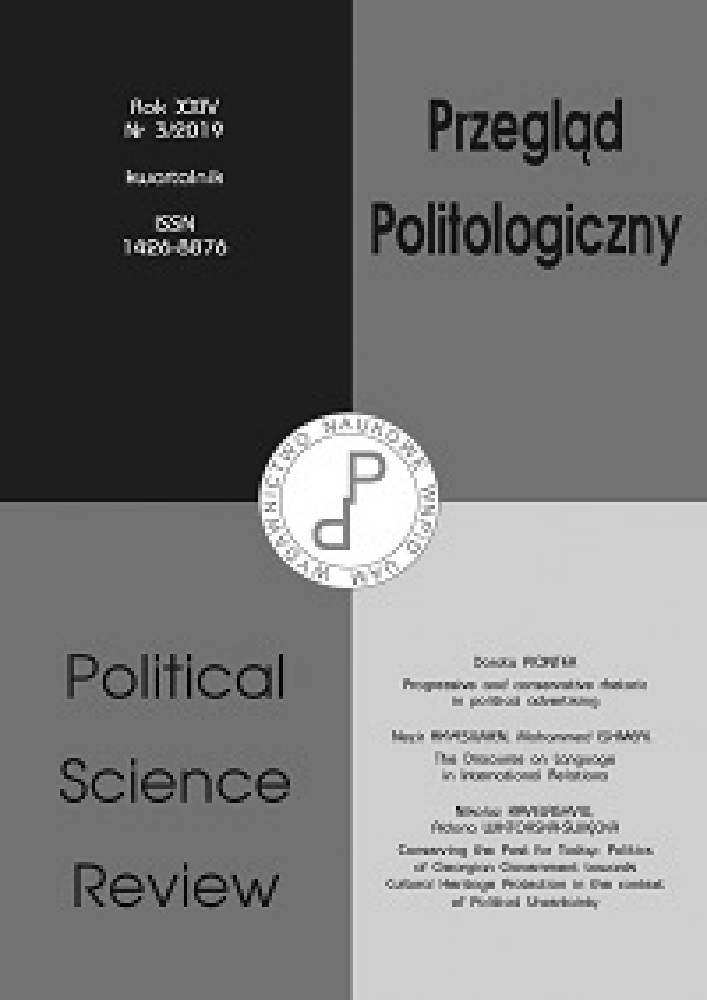Abstrakt
Niewiele się zmieniło od czasu, gdy Stanley Hoffman ogłosił, że stosunki międzynarodowe (IR) są amerykańską nauką społeczną, a John Hobson podkreślił „brak bezwartościowych i uniwersalistycznych teorii relacji międzypaństwowych.” W szczególności od 1970 r., wraz z końcem zimnej wojny oraz rozwojem technologii informacyjnych i komunikacyjnych (ICT), dyscyplina IR stanęła przed poważnymi wyzwaniami w stosunku do swoich podstawowych ram koncepcyjnych i teoretycznych. Pomimo szeregu zmian systemowych i pojawienia się nowego środowiska w stosunkach międzynarodowych, dziedzina ta nadal jest silnie uzależniona od starych, nieodpowiednich i/lub obciążonych wartością koncepcji z początku XX wieku. Co więcej, dyscyplina została przeciążona przez zestaw eurocentrycznych i etnocentrycznych koncepcji, które prowadzą studentów IR do kwestionowania jej międzynarodowego charakteru. Można dyskutować, czy wynika to z niekompetencji czy niewłaściwego używania języka. Artykuł ten ma na celu konstruktywną dekonstrukcję głównych i hegemonicznych koncepcji w IR. W pracy wykorzystano jakościową metodę analizy dyskursu, aby ponownie zbadać związek między użyciem języka i kontekstu, często uważaną za pewnik, co ogranicza rozumienie pojęć stosowanych w dyscyplinie IR w celu promowania innowacji i postępu w tej dziedzinie.
Bibliografia
Akyeşilmen N. (2016), Cybersecurity and Human Rights: Need for a Paradigm Shift?, “Cyberpolitik Journal”, vol. 1, no. 1, http://cyberpolitikjournal.org/wp-content/uploads/2017/07/cyberpolitikjournal-Cilt-1.pdf, Feb. 15, 2019.
Al Jazeera (2017), UN official resigns over Israel apartheid report. Israeli–Palestinian Conflict March 2017, www.aljazeera.com/news/2017/03/official-resigns-israel-apartheid-report170317182241142.html, Feb. 15, 2019.
Acharya A. (2014), Global International Relations (IR) and Regional Worlds A New Agenda for International Studies, “International Studies Quarterly” 58.
Ashworth L. M. (2014), A History of International Thought: From the origins of the modern state to academic international relations, Routledge, London.
Barkawi T., Laffey M. (2006), The Post-Colonial Moment in Security Studies, “Review of International Studies” 32 (2).
Barkawi T., Laffey M. (2002), Retrieving the Imperial: Empire and International Relations, “Millennium Journal of International Studies” 31 (1).
Bhaskar R. (1986), Scientific Realism and Human Emancipation, Verso, London.
Brukan S. (1978), The Nation-State: will it keep or weather away?, “International Social Science Journal”, vol. XXX, no. 1.
Crosby R. (2010), The Relativity of Language on Human Thought, http://www.shotoku.ac.jp/data/facilities/library/publication/education-gaikoku49_02.pdf, May 5, 2017.
Dessler D. (1989), What’s at Stake in the Agent-Structure Debate?, “International Organization”, vol. 43, no. 3.
Essayworld.com. (2007), Machiavelli’s “The Prince”: By Any Means Necessary, http://www.essayworld.com/essays/Machiavellis-The-Prince-Any-Means-Necessary/65028, Feb. 19, 2017.
Cassirer E. (1944), An Essay on Man: An Introduction to a Philosophy of Human Culture, Yale University Press, New Haven.
Fairclough N. (1995), Critical Discourse Analysis: The critical study of Language, London–New York.
Gaukroger G. (1986), Explanatory Structures: Concepts of Explanation in Early Physics and Philosophy, Humanities Press, Atlantic Highlands.
Goodey D. (2001), Frantz Fanon: Black Skin, White Mask by Isaac Julien, “Philosophia Africana” 4, no. 2.
Guyer P., Wood A. W. (eds.) (2001), Immanuel Kant, Critique of Pure reason, Cambridge University Press, Cambridge.
Hellmann G. (2011), International Relations as a Field of Study, in: International Encyclopedia of Political Science, eds. B. Badie, D. Berg-Schlosser, L. Morlino, Thousand Sage.
Hobson J. M. (2012), The Eurocentric Conception of World Politics: Western International Theory, 1760–2010, Cambridge University Press, Cambridge.
Hoffmann S. (1977), An American Social Science: International Relations, “Daedalus”, vol. 106, no. 3.
Holsti K. J. (1964), The Concept of Power in the Study of International Relations, “Background”, vol. 7, no. 4 (179–194), http://www.jstor.org/stable/3013644, Feb. 28, 2018.
Hsu F. L. K. (1964), Rethinking the Concept of Primitive, “Current Anthropology”, vol. 5, no. 3.
Jones B. G. (2006), Decolonizing International Relations, Plymouth.
Justus H. (1977), Language and Its Object: Philosophy and Phenomenological Research, “International Phenomenological Society”, vol. 38, no. 2.
Lowe C. (1997), Talking about “tribe”: moving from stereotypes to analysis, Africa Policy Information Center, Washington, D.C., http://www.ciaonet.org/wps/loc01, May 27, 2017.
Luke J. (2014), Terrorism: A Definition and Analysis, E. International Relations Students, http://www.e-ir.info/2014/02/09/terrorism-a-definition-and-analysis/#_ftn5, June 27, 2017.
Mandelbaum M. (1965), The History of Ideas, Intellectual History, and the History of Philosophy, “History and Theory”, vol. 5.
Mitchell C. et. al. (1986), State Terrorism: Issue of Concept and Measurement, in: Government Violence and Repression: An Agenda for Research, eds. M. Stohl, G. A. Lopez, Greenwood Press, New York.
Muni S. D. (1979), The Third World: Concept and Controversy, “Third World Quarterly”, vol. 1(3).
Nkrumah K. (1965), Consciencism – Philosophy and Ideology for Decolonization and development with particular reference to the African Revolution, Monthly Review Press, New York.
Proudfoot D. (2009), Meaning and mind: Wittgenstein’s relevance for the ‘Does Language Shape Thought? Debate’, “New Ideas in Psychology” 27, no. 2.
Reus-Smit C., Snidal D. (2010), The Oxford handbook of international relations, Oxford University Press, Oxford.
Said E. (1978), Orientalism, Routledge & Kegan Paul Ltd., New York.
Seargeant P. (2009), Language Ideology, Language Theory, and the Regulation of Linguistic Behaviour, “Language Sciences” 31.
Skinner Q. (1969), Meaning and Understanding in the History of Ideas, “History and Theory” 8 (1).
Smit N. (2013), The Continued Relevance of the ‘Third World’ Concept. E. International Relations, http://www.e-ir.info/2013/03/26/the-continued-relevance-of-the-third-world-concept/, March 3, 2017.
Thomas C. (1999), Where is the Third World Now?, “Review of International Studies” 25(5).
Tickner A. B., Waever O. (2009), Geocultural Epistemologies. International Relations Scholarship Around the World, Routledge, London–New York.
Tylor E. B. (1871), Primitive Cultures, vol. 1, John Murray, London.
Weber C. (2001), International Relations Theory: A Critical Introduction, Routledge, Taylor & Francis Group, London.
Whorf B. L. (1940), Science and linguistics, “Technology Review” 42.
Wight M. (1966), Why is there no International Theory?, in: Diplomatic Investigations, eds. M. Wight, H. Butterfield, Harvard University Press, Cambridge.

